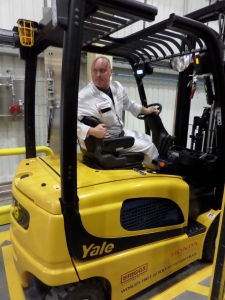 The modified Yale trucks are configured to use a small lithium-ion battery which partners with the fuel cell to ensure that the battery remains charged. |
Briggs Equipment and Honda have produced hydrogen fuel cell-powered trucks that rely entirely on renewable energy sources.
According to Briggs, other research projects have used hydrogen fuel that has been generated using fossil fuels. However, the collaboration between Briggs and Honda has seen the development of a fully integrated system that generates hydrogen from solar power via an on-site electrolyser.
The new system developed at Honda's Swindon manufacturing facility in the UK ensures that energy inputs are all clean and renewable with zero emissions.
Richard Close, Briggs Equipment CEO, explains how the consortium has worked with Honda to produce commercial volumes of "truly green" hydrogen to power the converted Yale trucks operating at the Swindon plant. "These hybrid trucks are the first to use lithium battery technology with a hydrogen fuel cell to replace standard lead-acid batteries, resulting in materials handling equipment that produces zero emissions at the point of use.
"The project has proved what can be achieved. The challenge is now to extend this as widely as possible."
The modified Yale trucks are configured to use a small lithium-ion battery that partners with the fuel cell to ensure that the battery remains charged. The battery can then operate as a normal power unit for all mobility and lift functions, supplied from its compact battery source. The hydrogen fuel cell acts as an on-board charger, allowing the truck to work more efficiently, avoiding its normal routine of battery switching and remote charging.
Refuelled from a conveniently sited fuelling station within the production area, the truck takes around five minutes to recharge its hydrogen cell.
According to Briggs, this breakthrough is seen as a proving ground for future development in emission-free forklift technology. However, it is recognised that in its current form, this process would not be viable for small fleets and would need the benefit of scale and further efficiencies to make it universally realistic.
"The benefits are clear," Close says. "Gone are the big lead-acid batteries and their need for space, replacement and maintenance. Maintenance alone is around one-and-a-half times lower. Productivity is also clearly a plus factor, allowing cost benefits to begin to stack up.
"There is also the potential to replace diesel engines and avoid an ever-tightening legislative determination to bear down on NOx and particulate emissions, plus the potential price and supply volatility of hydrocarbons fuels."
To date, the project consortium has focused on creating a whole system, from solar as its source to hydrogen as the output fuel, to run road vehicles - converted vans running normal duty patterns - as well as forklifts operating on-site. The consortium intends to investigate hydrogen as a means to provide power to the manufacturing plant in the future.